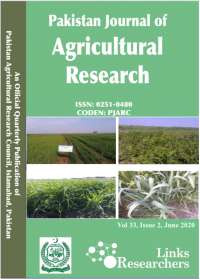Isolation, Purification and Application of Siderophore Producing Bacteria to Improve Wheat Growth
Isolation, Purification and Application of Siderophore Producing Bacteria to Improve Wheat Growth
Shabana Ehsan1*, Aneela Riaz2, Muhammad Amjad Qureshi1, Abid Ali1, Ifra Saleem3, Muhammad Aftab3, Khalid Mehmood4, Fakhar Mujeeb1, Muhammad Asif Ali1, Hina Javed1, Fraza Ijaz1, Anwar-ul-Haq5, Khaliq-ur-Rehman3 and M. Usman Saleem4
ABSTRACT
Iron (Fe), being an essential micronutrient, is necessary for human health and to maintain the integrity and development of the plant. In Fe-limiting conditions, plants and plant growth-promoting rhizobacterial (PGPR) have a siderophore production mechanism. Inoculation with seed soaking of such siderophore-producing bacteria can be a cost-effective biofortification technique. The current study includes the collection of rhizobacterial isolates from wheat, maize, sorghum, millet, and maize rhizosphere soil of Rawalpindi and Sargodha divisions. The screening of bacterial isolates for siderophore production through CAS-shuttle assay (quantitative) and CAS-agar (qualitative) was done. Isolates were further characterized for Fe and phosphorus solubilization, indole acidic acid (IAA) equivalents, and organic acid production. The growth chamber and field study was planned to evaluate the effectiveness of these isolates on the growth and yield parameters of wheat. Total bacterial isolates were 50, out of which 15 isolates were found significantly positive for the production of siderophore and solubilizing of nutrients. The (SPS10) produced a comparatively high percentage of 46.2 % siderophore units, as shown by results between positive isolates. Out of 15 positive, 7 isolates significantly improved root/shoot growth over control in the growth chamber study. Inoculation with siderophore-producing bacteria showed a significant increase in plant height, grain yield, spike length, grain weight, no. of tillers plant-1, and wheat quality in a field trial. The results from the current study proposed that in the plant, rhizobacteria can also play a beneficial role in nutrient translocation to plants efficiently and nutrients uptake from the soil insoluble form.
To share on other social networks, click on any share button. What are these?






